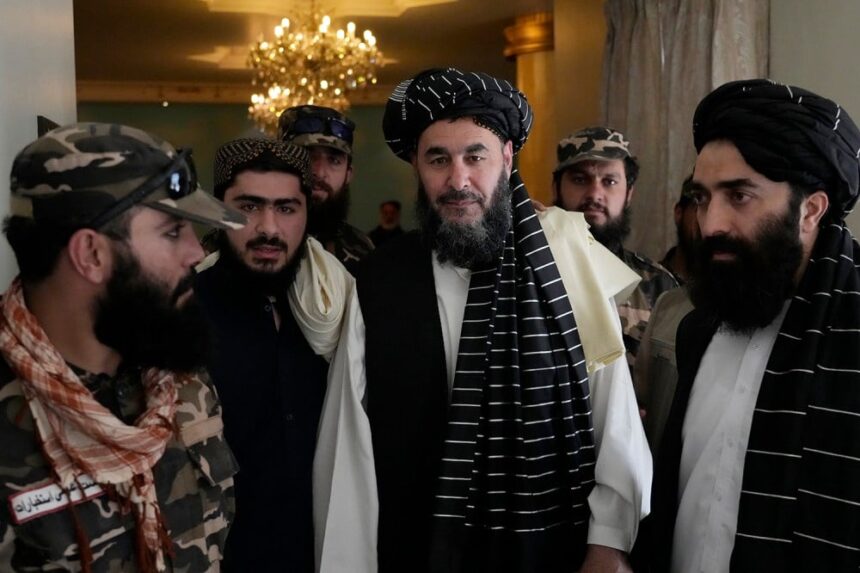Summary by Geopolist | Istanbul Center for Geopolitics
Bashir Noorzai, a notorious drug kingpin whose heroin empire significantly funded the Taliban’s war efforts in Afghanistan, was released early from a U.S. prison in exchange for an American hostage, former Navy diver Mark Frerichs, in a deal orchestrated by the Biden administration in September 2022. Upon his return, Noorzai quickly resumed his influential role, leveraging his connections to form joint ventures with Chinese firms.
Noorzai, a close associate of Taliban supreme leader Hibatullah Akhundzada, secured contracts for his company, Afg-Chin Oil and Gas Ltd., despite having no expertise in mining. These contracts, obtained through Afghanistan’s nontransparent bidding processes and his high-level connections, include lucrative deals for gold mines and oil and gas exploration in northern Afghanistan. His company is involved in exploring the hydrocarbon potential near the Amu Darya river, which borders Uzbekistan and Tajikistan.
China has formally acknowledged the Taliban’s legitimacy by accepting their representative as Afghanistan’s ambassador, a move that aligns with Beijing’s strategic interests in the region. China aims to exploit Afghanistan’s mineral wealth and integrate the country into its Belt and Road Initiative (BRI), a global infrastructure development strategy. Chinese mining firms’ contracts, facilitated by Noorzai and Taliban leaders, are part of a broader plan to secure resources and expand China’s influence.
Since retaking control of Afghanistan in August 2021, the Taliban has misappropriated humanitarian aid and cash flown in for assistance, which has further strengthened their regime. Their longstanding relationship with China’s Communist Party has been financially beneficial, with Chinese investments bringing in significant revenue despite the Taliban’s continued human rights abuses and ties to terrorist organizations.
Noorzai’s return to the business arena highlights his deep-rooted influence within the Taliban and Afghanistan’s corrupt mining sector. His leadership of the Noorzai tribes and early financial support for the Taliban have bolstered his position. Some believe his release might have involved a quid pro quo arrangement with Washington, although his current dealings suggest a pivot towards China as a primary benefactor.
Akhundzada’s recent ban on poppy cultivation, intended to curb heroin production, has shifted the Taliban’s focus to methamphetamine production, which is cheaper and more profitable. Meth is derived from the ephedra plant, abundant in Afghanistan, and has become a significant illicit trade.
Noorzai’s company secured a $310 million contract to develop the Samti gold deposit in Takhar province, a project fraught with corruption and inefficiency. Previous contractors lacked the expertise to extract the deposit’s estimated 31 metric tons of gold. Researchers like Javed Noorani criticize the contract as unprofessional and unrealistic, predicting that it will likely result in continued corruption rather than genuine development.
In this scenario, the mine remains undeveloped, no profits benefit the Afghan state, no jobs are created, and investments from small-scale subcontractors are lost. The only beneficiaries are Noorzai and his associates within the Taliban leadership.
Read more below.
How an Afghan Drug Kingpin Became Beijing’s Man in Kabul
A drug kingpin whose heroin empire helped fund the Taliban’s long war in Afghanistan—and who was released early from a U.S. prison in a trade for an American hostage—has now gone into business with China.
Bashir Noorzai, a close friend of the extremists’ supreme leader, has set up murky joint-venture deals with Chinese firms in Afghanistan that have won at least two minerals and petrochemical contracts, which mining and security sources said are little more than rentier operations raking in cash but doing nothing to develop the impoverished country.
The Taliban’s multibillion-dollar heroin production and export enterprises have dominated the global market for decades. Before his imprisonment, Noorzai was the don of the heroin trade, sometimes referred to as the “Pablo Escobar of Afghanistan” after the Colombian cocaine king who ran the Medellín cartel until his death in 1993.
Noorzai—a confidant of Hibatullah Akhundzada, the Taliban’s commander of the faithful—was freed in September 2022, in a deal struck by the Biden administration for the return of former U.S. Navy diver Mark Frerichs, who’d been held hostage by a Taliban offshoot called the Haqqani network for two-and-a-half years.
Noorzai returned home a hero and got right back to business, working closely with Akhundzada to snag contracts for gold mines as well as oil and gas exploration in northern Afghanistan, despite having no expertise in mining, researcher Javed Noorani, an expert on Afghanistan’s mining sector, told Foreign Policy. “He has become like one of the warlords,” Noorani said, comparing Noorzai to the late Mohammad Qasim Fahim, an enormously powerful warlord who became a vice president of the republic.
Noorzai’s success in winning the contracts for his company, Afg-Chin Oil and Gas Ltd.—set up with a Chinese partner—was due to Afghanistan’s “nontransparent bidding process” and, most importantly, his friendship with the top man, Noorani said.
Noorzai is also close with the Taliban’s acting foreign minister, Amir Khan Muttaqi, who has a tight grip on oil contracts, said a source with insider knowledge who wished to remain anonymous. Noorzai’s company has an exploration contract to study the hydrocarbon potential near the Amu Darya, the river border with the Central Asian states of Uzbekistan and Tajikistan. “They owe Noorzai a lot,” the source said, referring to the Taliban.
The revelation that Akhundzada is supporting his old friend’s business expansion coincides with China’s announcement that President Xi Jinping had accepted the credentials of the Taliban representative in Beijing as the ambassador for Afghanistan, effectively breaking ranks with the rest of the world in acknowledging the Taliban’s legitimacy. Asadullah Bilal Karimi joined dozens of newly arrived ambassadors for a formal ceremony at Beijing’s Great Hall of the People on Jan. 30. Chinese Foreign Ministry spokesman Wang Wenbin described it as normal diplomatic protocol.
China’s long-held plans to exploit Afghanistan’s mineral wealth now appear to dovetail directly with the Taliban’s need for money and the diplomatic recognition that will confer legitimacy on their government.
Since taking control of Afghanistan in August 2021, the group has pilfered cash and aid flown in for humanitarian assistance (reported by Foreign Policy and confirmed in a recent report by the Special Inspector General for Afghanistan Reconstruction, the U.S. government’s oversight authority for the country). The Taliban’s long relationship with China’s ruling Communist Party has paid off since they returned to power, with contracts for Chinese mining firms bringing in hundreds of millions of dollars.
China’s government, which has forced approximately 1 million Muslim Uyghurs into detention camps, seems unperturbed by the Taliban’s extreme behavior. The group has banned women from education and work, and it continues to pursue and kill members of the former government and military. The United Nations has catalogued extensive human rights violations by the Taliban; the U.N. Security Council has repeatedly reported on the Taliban’s ties to al Qaeda and other banned terrorist organizations.
China’s motivation goes beyond access to strategic minerals; Afghanistan is integral to the expansion of Beijing’s Belt and Road Initiative (BRI) global infrastructure program, with roads and railways planned for moving Chinese manufactured products through Central Asia to European markets.
Beijing has also been sharing surveillance technology and equipment with the Taliban, which serves a double purpose: The Taliban can more efficiently track down their enemies, and Chinese security agencies can identify Uyghurs who have the Taliban’s protection as members of the anti-China East Turkestan Islamic Movement—a Taliban affiliate whose members the Taliban cannot unilaterally hand over to China, where they would face almost certain execution.
Akhundzada is believed to support attacks on civilian, police, and military targets in neighboring Pakistan by Taliban affiliate Tehrik-i-Taliban Pakistan. The TTP, like many other transnational jihadi and terrorist groups, is protected in Afghanistan as they fight for control of Pakistan’s northwestern tribal regions.
The security challenge posed by the Taliban’s return to power in Afghanistan has dawned on neighboring countries, including China, which is still not completely immune to extremism despite keeping the Taliban close for decades. Chinese people and installations have been targeted by Taliban in both Afghanistan and Pakistan, where Beijing has poured in billions of dollars of BRI investment and loans that have bailed the country out of near-bankruptcy.
Noorzai’s return to business promises to keep the cash flowing into the coffers of one of the world’s richest criminal cartels. Most of his business activity is in the southern poppy belt centered on the province of Helmand, where he has huge land holdings and runs his businesses “like a Mumbai slumdog billionaire,” said the source who chose to remain anonymous.
As leader of the Noorzai tribes, he has kinship with many Taliban leaders and was an early and generous financier. He is believed to have political influence within the group, and before his arrest in 2005 for heroin smuggling, to have acted as an intermediary with the United States. He was sentenced to life imprisonment in 2009.
Some figures of the previous government suspected that his release could have been conditional on him once again being Washington’s conduit to the Taliban leadership. His move into the mining business, however, could be a sign that he is no longer Washington’s man and instead sees China as the future source of funding that will keep the Taliban in power.
Akhundzada has banned poppy production—though Noorzai likely has ample opium stockpiles—thus facilitating the Taliban’s move into the more lucrative methamphetamine market. Meth is the product of the ephedra plant, which grows wild in Afghanistan; it can also be made with chemical inputs that are cheap and readily available. No matter how it is made, it is much cheaper to produce than heroin, and the return is much higher. The ban on poppy production has already led to a huge rise in meth production, evidenced by intercepts worldwide; Iranian border guards announced on Jan. 2 that they had seized 171 kilograms (377 pounds) of Afghan meth during a recent operation.
Noorzai’s new business ventures are a reminder that corruption has long been a hallmark of Afghanistan’s mining sector. For decades, the Afghan people have been told that vast deposits of resources—from coal, copper, and iron to precious stones, lithium, marble, gold, and much more—are poised to catapult their country to prosperity. Instead, the 20-year war and a lack of infrastructure kept the big players out while the Taliban used the violence as cover for large-scale looting.
Noorzai appears to be continuing that tradition, albeit through quasi-official channels now controlled by the Taliban. His firm has a $310 million three-year contract to develop the Samti gold deposit in the northern province of Takhar, involving a mine with a history of attracting well-connected fly-by-nighters.
Noorani, the researcher, said the last contractor of the mine, West Land General Trading, also lacked the expertise and capacity to extract the deposit’s estimated 31 metric tons of gold from deep, rocky riverbeds, but won the contract through connections to a minister in the former government.
Afg-Chin’s contract says it will pay 56 percent of profits to Afghanistan, with development scheduled to start within three months. Noorani called the contract “unprofessional and unrealistic,” and he said that any serious mining firms would take years of testing, planning, and preparation before mining could begin. Extensions have already been granted, he added.
It’s more likely, he said, that Noorzai will sell shares in the company to his Chinese partner, which will then sell its interests to small-scale Chinese companies, which in turn will further salami-slice their shares, keeping the money flowing in what he called a “chain reaction of corruption.”
In this rentier scenario, the mine is not developed, no profits flow to the Afghan state, no jobs are created, and all investments from small-scale subcontractors are lost, Noorani said.
Everyone loses but Noorzai and his cohorts in the Taliban leadership.
By Lynne O’Donnell,
Source: Foreign Policy







